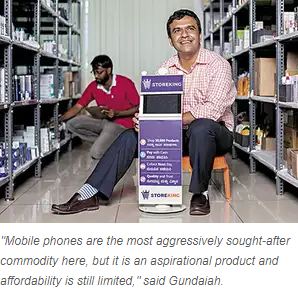Name of the Company – StoreKing
Name of the Founder(s) – Sridhar Gundaiah
City – Bangalore
Revenues: NA
Headcount – 200+
Industry – Tech-enabled rural retail
Investors & amount raised – Mangrove Capital invested $2 million in 2012, followed by an investment of $4 million in 2014- Axiata Digital invested $16 million in 2016
Hailing from a small town a few kilometres away from Bangalore, Sridhar Gundaiah was sensitized early on to the digital divide created by technology between his hometown and the city he had moved to after completing his education. “Technology may be spoken of as a great equalizer and Internet access seems increasingly affordable today, but its inclusivity is debatable,” he says. “Inadequate access to technology leaves behind a large swath of the population who are hindered from experiencing things that have become commonplace for city-dwellers. This always drove me to take technology into rural areas,” he added.
It was pure chance then that this innovative undertaking was driven by commerce. “I wanted to take an approach that would connect people in a way that they could understand the uses of technology in a simple yet utilitarian way and e-commerce was one way of doing that,” says the founder of the four-year-old rural retail commerce provider Storeking.
The company reaches out to retailers in rural pockets of the country to try and convince them to install a StoreKing kiosk at their stores. Available for purchase at Rs 10,000, it contains an application that has over 80,000 products loaded into the system which customers can browse through and buy after paying the retailer. “The retailer can guide customers on how to navigate through the interface and once an order has been placed, they will get an SMS from Storeking in vernacular,” says Gundaiah.
A difficult proposition
Admittedly, however, it is not easy to persuade merchants to make an investment of Rs 10,000 for an experiment that to them, may or may not work. “Even if they receive 6-10% commission on sales made through the machine, retailers are sceptical about its benefits because the concept is very new to them. Convincing an end customer is much easier – real challenge is to bring retailers on board,” he says. “It was a challenge initially to just sell the idea – execution and implementation hurdles came much later. But, once it took off, the progress that this project made has been phenomenal,” he adds.
This may not be tall talk for a company that has seen store adoption climb from just 400 in the first two and a half years of service to more than 25,000 in just the last 18 months. “This kind of scale requires a lot of research, patience and conceptualization to understand what clicks in this market. It is important to know where your target audience comes from – they do not know your brand and have no experience to fall back on when it comes to its veracity. Once we were able to resolve these issues, we have been able to dabble in things which we could not have dreamt of in the initial years,” says Gundaiah.
Hot seat
Customers buy things that are otherwise not available in a regular retail or kirana shop. “Mobile phones are the most aggressively sought-after commodity here, but it is an aspirational product and affordability is still limited,” said Gundaiah, when probed on the kind of products that are listed on the portal and what item sells the most. “But consumer mindset is constantly changing – they are becoming more and more aspirational. Today, we also have people buying premium anti-aging creams on the platform. These give us great insights into what a customer wants and we have come to understand that there will be demand as long as availability is taken care of,” he added.
In addition to its own inventory of products, the Bangalore-based company also has an exclusive partnership with Amazon India. “Mobile internet in rural areas alone does not mean that people will be comfortable making transactions online – priority is always given to entertainment, communication and social networking, in that order,” says Gundaiah. “Bigger players in the e-commerce space find it difficult to tap this market for the same reasons, but we have addressed that problem with assisted commerce,” he adds.
Storeking has made rapid strides since it first started off in 2012. It is now spread out over 100 districts across the length and breadth of the country, covering 2,500 unique towns and reaching out to over 10 million customers in just four years. “We also have 25,000 working retailers on our platform today, adding anywhere between 2,500 to 3,000 every month now,” concludes Gundaiah.
StoreKing’s vision is to become one of the largest rural retail players by 2018 with 1,00,000 retailers across the country. With 25,000 retail stores as part of their network, the company serves around 10 million customers in a month across 100 districts in rural India. Currently, StoreKing operates in tier 2 and tier 3 cities in Karnataka, Kerala, Tamil Nadu, Andhra Pradesh, Telangana, Gujarat, Maharashtra, Goa and Madhya Pradesh. Going forward, it will look to establish itself in Rajasthan and Orissa.
Article Source: Economic Times

